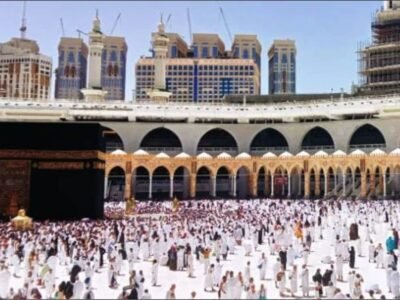
Hajj: Maqbul dan Mabrur (Part 3)
As a Ritual Worship, Hajj Has Conditions, Pillars, Obligations, Sunnah Practices, and Prohibitions that Must Be Seriously Observed and Performed by Every Pilgrim
Minister of Religious Affairs, Prof. Dr. Nasaruddin Umar, MA, stated that the performance of Hajj must aim to achieve both maqbul (accepted) and mabrur (blessed) status (National Coordination Meeting, April 22, 2025). Maqbul is pursued by ensuring that all the pillars, conditions, obligations, and prohibitions of Hajj are strictly observed. Meanwhile, mabrur is pursued by establishing a commitment to personal improvement after returning from Hajj.
By focusing on both aspects, it means that all parties involved in the implementation of Hajj — whether the pilgrims, guides, muthawwif, support personnel, government, or travel agencies — must pay attention to the entirety of the process. This includes not only the proper execution of the ritual but also the reinforcement of the commitment to transformation upon returning from the Holy Land. In other words, the preparation for Hajj should encompass both dimensions.
Prepare Provisions, Especially the Provision of Taqwa (God-Consciousness)
Many have said that Hajj is a physical act of worship, and thus, physical preparation is highly emphasized — health, accommodations, food, medicine, and other logistics. Accordingly, the staff are carefully trained. Matters concerning the fulfillment of the pillars, conditions, obligations, and prohibitions of Hajj are repeatedly addressed during manasik (pre-Hajj training), and muthawwif and religious guides are also prepared to assist pilgrims during their stay in the Holy Land. For the sake of solemnity in performing Hajj, pilgrims are prohibited from committing indecency (fusuq), lewdness (rafats), and dispute (jidal) as mentioned in Qur’an, 2:197. All of these efforts aim to ensure the pilgrimage runs smoothly according to Islamic jurisprudence (fiqh) and is accepted (maqbul) by Allah.
But what about mabrur?
As emphasized in Surah Al-Baqarah, verse 197, “The best provision is indeed taqwa (God-consciousness).” Therefore, taqwa must become the primary focus, highly emphasized, and sincerely pursued by all involved.
For the pilgrims, preparing for taqwa can be internalized and practiced by strengthening a sincere and pure intention — that their Hajj is solely for Allah (Qur’an, 2:196), not for praise (showing off, obtaining the “Haji” title), rank, wealth, or other material goals. Hajj is purely about submission, obedience, and sincerity in approaching Allah.
For the Hajj officials, both from the government and private sector who serve the pilgrims, taqwa means solidifying the intention that their duties are acts of devotion — helping Allah’s servants in their journey to Him — not merely to earn a salary, honorarium, or profit.
For Hajj/Umrah travel agencies, the preparation for taqwa can be realized through sincere efforts (jihad) to assist those who seek to approach Allah, by also providing meaningful understanding and context to every Hajj ritual.
Understanding and Internalizing the Meaning of Hajj Rituals
This aspect — understanding and internalizing the meaning of the rituals — should become the main concern and be seriously pursued, especially by travel agencies and religious guidance institutions (KBIH), because this directly relates to how the values of Hajj are elaborated into professional life, organizational conduct, and daily activities after returning home.
Hajj Rituals and the Formation of Mindset
As a ritual act of worship, Hajj comprises conditions, pillars, obligations, recommended acts, and prohibitions, which must be diligently followed by every pilgrim. However, as a process, Hajj can also be understood as a journey of mindset and personality formation for those who perform it. From the rituals of intention (niyyah), ihram, tarwiyah, wuquf, mabit, ramy al-jamarat, tawaf, sa’i, to tahallul — each stage is a phase of mindset development.
Certainly, the mindset formed through Hajj aligns with human nature and ideal character. Furthermore, the mindset built through Hajj represents the core elements of success in professional life. Thus, each stage of the Hajj rituals should be explored and elaborated in relation to professional contexts, so that after returning home, pilgrims can manifest the values of a mabrur Hajj.
By focusing on solemn rituals and the development of a professional mindset, pilgrims can avoid the traps of a misguided Hajj, such as:
- “Materialistic Hajj” — motivated purely by wealth;
- “Touristic Hajj” — intended merely for traveling, shopping, and leisure;
- “Selfie Hajj” — performed only for show, fame, and social media recognition;
- “Political Hajj” — done solely to support a political campaign, secure project success, gain promotions, and so on.
Conclusion
The performance of Hajj should encompass both the maqbul and mabrur dimensions. Maqbul signifies the acceptance of the Hajj by Allah, while mabrur refers to the blessed transformation that continues upon returning home. Thus, for the pilgrim, Hajj should not be merely a ritual, but a journey of forming a professional and spiritual mindset.
Fa’tabiru ya ulil albab — So take heed, O people of understanding.
Legisan Samtafsir, Founder of the Indonesia Mabrur Movement, Chairman of Gernas Indonesia Gemilang







